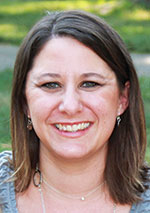Investing with Faith / Jolinda Moore
Socially responsible investments and the Catholic Community Foundation
 “Love God. Love people. Do something about it.” The words I saw painted on the side of a pickup truck couldn’t have said it better. Integrity, after all, is what the season of Lent is all about.
“Love God. Love people. Do something about it.” The words I saw painted on the side of a pickup truck couldn’t have said it better. Integrity, after all, is what the season of Lent is all about.
During these 40 days, we are challenged to bring our words and deeds together; to erase any space that’s grown between what we believe and how we live. And that includes what we do with the resources—financial and otherwise—that we have been given by God’s grace.
For Catholic donors in the Archdiocese of Indianapolis, the Catholic Community Foundation (CCF) offers peace of mind. A recent conversation with Msgr. William F. Stumpf and Brian Burkert, who oversee investment funds through the archdiocesan Investment Committee, highlighted just how deeply committed CCF is to socially responsible investments (SRIs).
“We have a duty to make sound investments, but in a way that follows what we believe,” said Burkert, archdiocesan chief financial officer and executive director of finance and administrative services.
“Socially responsible investments [SRIs] involve investment strategies based on moral demands set in place by the virtues of prudence and justice,” added Monsignor Stumpf, archdiocesan vicar general. “We don’t want to support something other than what we preach from the pulpit. The Church is committed to walking the walk. We have to be the best stewards possible.”
While most ethically-minded investors have heard of environmental, social and governance funds, for example, many Catholics may be unaware that there is an even higher standard available to them.
Burkert observed, “Socially responsible investments assure Catholic donors that their resources are being used to support initiatives that are consistent with their faith.” To assist the Archdiocesan Investment Committee, the U.S. Conference of Catholic Bishops (USCCB) has created and updated guidelines for socially responsible investments based on two principles:
-
Investments should obtain a reasonable rate of return, one that matches the market.
-
Investments should be based on Catholic moral principles.
“In managing the investment of funds through the Investment Committee and the guidance from the USCCB, the foundation is particularly attractive to donors looking to leave legacy gifts or bequests,” Burkett noted. “They know we have a faith-filled community watching over their hard-earned contributions. They know their values and beliefs will fund the Church long after they have left this Earth.”
Monsignor Stumpf is motivated by the words of the 1986 USCCB pastoral letter, “Economic Justice for All: Pastoral Letter on Catholic Social Teaching and the
U.S. Economy.” In it, the bishops state, “Economic decisions have human consequences and moral content; they help or hurt people, strengthen or weaken family life, advance or diminish the quality of justice in our land.” As Burkert observes, “That’s what differentiates us from other organizations.”
Surprisingly, it isn’t difficult to find investment opportunities that are completely consistent with Gospel values. Numerous initiatives offer investors the chance to contribute their resources to activities and products that protect human life; promote human dignity; enhance the common good; pursue economic justice; and care for creation. As a result, the CCF is creating financial stability for much-needed ministries while earning a reasonable return for investors.
But it’s the accountability and governance that make Monsignor Stumpf and Burkert most proud. In contrast to other community foundations, CCF funds are evaluated twice a year by independent experts. If necessary, CCF will divest from anything that does not continue to meet the SRI standards. The high level of accountability and follow-through assures that faith directs every decision that is made.
As Monsignor Stumpf notes, “Underneath all of this is to do the right thing. We are deeply aware that we are just stewards of all we have, so we treat it with care because we aren’t owners—only stewards. All has been given to us by God. And we’re so very grateful for the generosity of people that makes it possible to serve God and make a difference in the world.”
(Jolinda Moore is executive director of the archdiocesan Office of Stewardship and Development and the Catholic Community Foundation [CCF]. Tax or legal information provided herein is not intended as tax or legal advice. Always consult with your legal, tax or financial advisors before implementing any gift plan. If you would like to learn more about including your parish in your estate plans, please contact us any time. We exist to exclusively serve you and your parish in planned giving. For more information on the CCF, visit www.archindy.org/CCF, e-mail ccf@ archindy.org, or call 317-236-1482.) †
 “Love God. Love people. Do something about it.” The words I saw painted on the side of a pickup truck couldn’t have said it better. Integrity, after all, is what the season of Lent is all about.
“Love God. Love people. Do something about it.” The words I saw painted on the side of a pickup truck couldn’t have said it better. Integrity, after all, is what the season of Lent is all about.